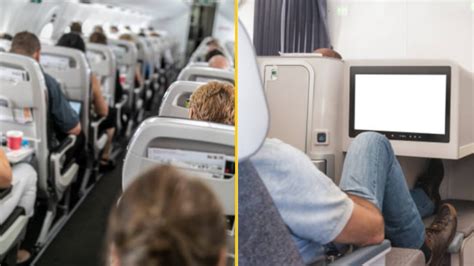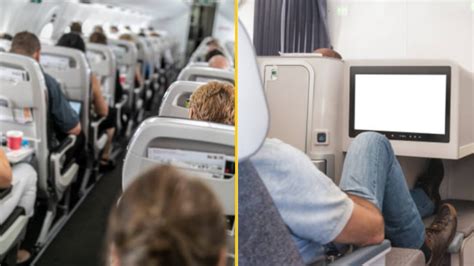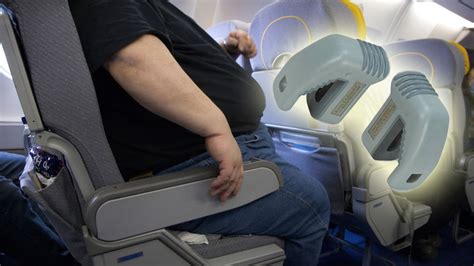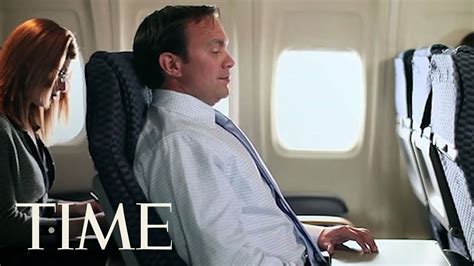
Reclining your airplane seat might soon come with a financial penalty, as some airlines are considering implementing fines for passengers who recline their seats during flights, potentially signaling a shift in onboard etiquette.
Passengers who frequently recline their seats on airplanes could soon face fines, as airlines explore new measures to address this long-standing source of passenger discomfort and conflict. The move comes amid growing frustration among travelers regarding the limited space and increasing tensions in the confined environment of air travel. Airlines are carefully weighing the potential implications of such a policy, considering factors like passenger reactions, enforcement challenges, and the overall impact on the flying experience.
According to recent discussions within the aviation industry, several airlines are contemplating introducing a system where passengers who recline their seats excessively or at inappropriate times (such as during meal service) could be subject to a fine. The exact amount of the fine is still under consideration, with sources suggesting it could range from \$25 to \$100, depending on the airline and the severity of the infraction. The concept has sparked mixed reactions, with some travelers applauding the idea as a way to maintain personal space, while others criticize it as an overreach by airlines and a further erosion of passenger rights.
“The idea behind this is to create a more respectful and comfortable environment for everyone on board,” an anonymous airline executive told Yahoo! Lifestyle. “We’ve received numerous complaints about passengers feeling cramped and disturbed by reclining seats, and we believe that a financial deterrent might encourage more consideration.”
The debate over reclining seats has been a persistent issue in air travel, often escalating into heated arguments between passengers. Those in favor of reclining argue that it is their right, as seats are designed to recline and passengers have paid for that feature. Conversely, passengers seated behind often feel their personal space is invaded and their comfort compromised, especially on shorter flights or when trying to work or eat.
Implementing such a policy presents several logistical challenges. Airlines would need to clearly define what constitutes “excessive” or “inappropriate” reclining and establish a fair and consistent enforcement mechanism. Flight attendants would likely bear the responsibility of monitoring seat reclining and issuing warnings or fines, potentially adding to their already demanding workload. Furthermore, airlines would need to address potential disputes between passengers and ensure that the policy is transparent and clearly communicated to all travelers before boarding.
The move towards fining passengers for reclining seats reflects a broader trend in the airline industry of seeking new revenue streams and addressing passenger pain points. Airlines have increasingly unbundled services, charging extra for things like checked baggage, seat selection, and in-flight meals. The potential introduction of reclining fines could be seen as another step in this direction, with some critics arguing that it is simply a way for airlines to squeeze more money out of passengers.
However, proponents of the policy argue that it is not solely about revenue generation but also about improving the overall passenger experience. By discouraging excessive reclining, airlines could create a more comfortable and respectful environment for all travelers, reducing the likelihood of conflicts and enhancing customer satisfaction.
The potential impact of reclining fines on passenger behavior remains to be seen. It is possible that the threat of a fine would deter some passengers from reclining their seats, leading to a decrease in complaints and a more harmonious onboard atmosphere. However, it is also possible that the policy could backfire, leading to increased resentment and resistance from passengers who feel their rights are being violated.
Airlines considering such a policy will need to carefully weigh the potential benefits and drawbacks and ensure that it is implemented in a fair, transparent, and consistent manner. They will also need to engage in open communication with passengers to address their concerns and explain the rationale behind the policy. Only time will tell whether reclining fines become a widespread practice in the airline industry or remain a controversial experiment.
The move to potentially fine passengers for reclining seats isn’t occurring in a vacuum. It reflects a confluence of factors, including shrinking seat sizes, increasing passenger loads, and heightened sensitivity to personal space in the wake of the COVID-19 pandemic. The airline industry has been under immense pressure to improve profitability and efficiency, often at the expense of passenger comfort. This latest consideration seems to further tip the scale, raising questions about how far airlines will go to optimize revenue generation while potentially sacrificing customer satisfaction.
Adding to the complexity is the global variation in cultural norms regarding personal space. What is considered acceptable reclining behavior in one country might be seen as highly inconsiderate in another. Airlines operating international routes will need to navigate these cultural differences carefully to avoid misunderstandings and conflicts.
Moreover, the policy raises questions about fairness and accessibility. Passengers with disabilities or medical conditions that require them to recline their seats may be unfairly penalized. Airlines would need to establish clear guidelines and exemptions to ensure that the policy does not discriminate against vulnerable passengers.
The introduction of reclining fines could also have unintended consequences for flight attendants. They could find themselves in the unenviable position of having to police seat reclining and issue fines, potentially exposing them to increased passenger aggression and abuse. Airlines would need to provide adequate training and support to flight attendants to help them manage these challenging situations.
Ultimately, the success of any reclining fine policy will depend on how well it is implemented and communicated. Airlines will need to clearly define the rules, enforce them consistently, and provide passengers with a fair and transparent appeals process. They will also need to be prepared to address the inevitable backlash from passengers who feel they are being unfairly treated. The discussion highlights the ongoing tension between airlines seeking to maximize profits and passengers seeking a comfortable and enjoyable flying experience.
Further Context and Considerations:
The debate over reclining seats is not new. Online forums and social media platforms are filled with countless anecdotes and complaints about inconsiderate seat reclining. Some passengers have even resorted to using devices like the “Knee Defender,” a small gadget that prevents the seat in front from reclining, leading to further conflict and even legal action.
The issue has also caught the attention of lawmakers and consumer advocacy groups. Some have called for airlines to set minimum seat pitch standards to ensure adequate legroom and reduce the need for passengers to recline their seats. Others have proposed alternative solutions, such as “recline-free zones” on airplanes or adjustable headrests that allow passengers to recline without impacting the person behind them.
The introduction of reclining fines could be seen as a more proactive approach by airlines to address this issue. By establishing clear rules and consequences, airlines hope to create a more respectful and comfortable environment for all passengers. However, the policy also raises concerns about overregulation and the potential for abuse.
Some critics argue that airlines should focus on more fundamental improvements to the flying experience, such as providing more legroom, better in-flight entertainment, and more attentive customer service. They believe that addressing these underlying issues would do more to improve passenger satisfaction than simply fining people for reclining their seats.
The debate over reclining seats is likely to continue for the foreseeable future. As airlines continue to grapple with the challenges of balancing profitability and customer satisfaction, it is important for passengers to be aware of their rights and responsibilities and to engage in respectful and considerate behavior.
The airline industry faces several significant challenges, including rising fuel costs, increased competition, and evolving passenger expectations. These challenges have forced airlines to seek new ways to generate revenue and improve efficiency. The potential introduction of reclining fines is just one example of how airlines are trying to adapt to the changing landscape of air travel.
While the policy may be controversial, it also reflects a growing recognition that passenger comfort and well-being are essential to the long-term success of the airline industry. Airlines that prioritize the passenger experience are more likely to attract and retain loyal customers.
The discussion surrounding reclining seats also highlights the importance of clear communication and transparency. Airlines need to be upfront with passengers about their policies and procedures and provide them with the information they need to make informed decisions. This includes clearly communicating the rules regarding seat reclining and providing passengers with a fair and transparent appeals process.
The airline industry is a complex and dynamic environment. As technology evolves and passenger expectations change, airlines will need to continue to adapt and innovate to remain competitive. The potential introduction of reclining fines is just one small example of the many challenges and opportunities that airlines face.
Looking ahead, it is likely that the airline industry will continue to experiment with new ways to improve the passenger experience and generate revenue. This could include the introduction of new technologies, such as virtual reality headsets and personalized in-flight entertainment systems. It could also include the implementation of new policies and procedures, such as dynamic pricing for seat selection and priority boarding.
Ultimately, the success of any new initiative will depend on how well it is implemented and communicated. Airlines that prioritize passenger comfort, transparency, and clear communication are more likely to succeed in the long run.
The potential for airlines to implement fines for reclining seats brings up the concept of the “tragedy of the commons,” a situation where individuals acting independently and rationally according to their own self-interest deplete a shared resource, even when it is clear that it is not in anyone’s long-term interest. In this case, the shared resource is the limited space and comfort available in an airplane cabin. While each passenger may feel entitled to recline their seat to maximize their own comfort, the cumulative effect of many passengers reclining their seats can lead to a significant reduction in comfort for those behind them, ultimately diminishing the overall flying experience for everyone.
The proposed fines can be seen as an attempt to internalize the externality of reclining, forcing passengers to consider the impact of their actions on others. By imposing a cost on reclining, airlines hope to incentivize passengers to be more mindful of their fellow travelers and to consider alternative ways to improve their comfort, such as using neck pillows or requesting a different seat.
However, the success of this approach will depend on how effectively the fines are enforced and how fairly they are perceived. If the fines are seen as arbitrary or discriminatory, they could lead to resentment and resistance from passengers. Airlines will need to carefully consider the potential unintended consequences of this policy and ensure that it is implemented in a way that is both effective and equitable.
The issue of reclining seats also touches on broader questions about the social contract of air travel. Passengers are essentially entering into a shared space for a limited period of time, and they are expected to adhere to certain norms of behavior to ensure that the experience is as pleasant as possible for everyone. Reclining seats, along with other behaviors such as talking loudly on the phone or taking up too much overhead bin space, can be seen as violations of this social contract.
By imposing fines for reclining, airlines are effectively trying to codify these norms and create a more enforceable framework for passenger behavior. However, this approach also raises concerns about the potential for overregulation and the erosion of individual freedom. Airlines will need to strike a delicate balance between enforcing reasonable standards of behavior and respecting the rights of passengers to make their own choices.
The debate over reclining seats is a microcosm of the larger challenges facing the airline industry. As airlines continue to operate in an increasingly competitive and cost-conscious environment, they will need to find innovative ways to improve the passenger experience while also maximizing profitability. This will require a careful consideration of the needs and expectations of both passengers and airlines, as well as a willingness to experiment with new policies and technologies.
The long-term solution to the reclining seat problem may not be fines at all, but rather a redesign of airplane cabins to provide more space and comfort for all passengers. This could involve increasing seat pitch, installing adjustable headrests, or creating separate “recline-free zones” on airplanes. However, such changes would likely be costly and could require airlines to reduce the number of seats on each plane, potentially leading to higher ticket prices.
In the meantime, the debate over reclining seats is likely to continue to be a source of frustration and conflict for many air travelers. Passengers who are concerned about being reclined upon should consider choosing seats with limited recline or politely asking the person in front of them to refrain from reclining. Ultimately, the key to resolving this issue is mutual respect and consideration for the needs of others.
Frequently Asked Questions (FAQ):
1. Can airlines really fine passengers for reclining their seats?
Potentially, yes. According to industry reports and discussions, some airlines are considering implementing fines for passengers who recline their seats excessively or at inappropriate times. However, this policy is not yet widespread, and the specifics, such as the amount of the fine and the enforcement mechanism, are still under consideration. “The idea behind this is to create a more respectful and comfortable environment for everyone on board,” an anonymous airline executive told Yahoo! Lifestyle. “We’ve received numerous complaints about passengers feeling cramped and disturbed by reclining seats, and we believe that a financial deterrent might encourage more consideration.”
2. How much could the fine be for reclining a seat?
The potential fine amount varies depending on the airline. While nothing is set in stone, sources suggest the fine could range from \$25 to \$100. The severity of the infraction, such as reclining during meal service or excessively reclining on a short flight, may also influence the amount.
3. Who would enforce the reclining seat fine?
Flight attendants would likely be responsible for monitoring seat reclining and issuing warnings or fines. This could add to their workload and potentially expose them to passenger disputes. Clear guidelines and training would be necessary to ensure consistent and fair enforcement.
4. What constitutes “excessive” or “inappropriate” reclining?
This is a key point that airlines need to define clearly. It could include reclining during meal service, reclining excessively on short flights, or reclining to the point where it significantly impacts the comfort of the passenger behind. The definition would need to be transparent and communicated to passengers before boarding.
5. Are there exceptions to the reclining seat fine policy?
Yes, there would likely be exceptions for passengers with disabilities or medical conditions that require them to recline their seats. Airlines would need to establish clear guidelines and exemptions to ensure the policy does not discriminate against vulnerable passengers. Passengers with legitimate reasons for reclining would need to be accommodated without penalty.









